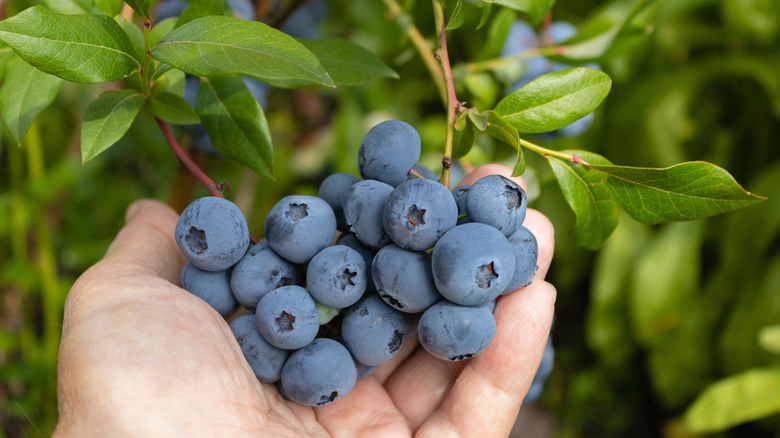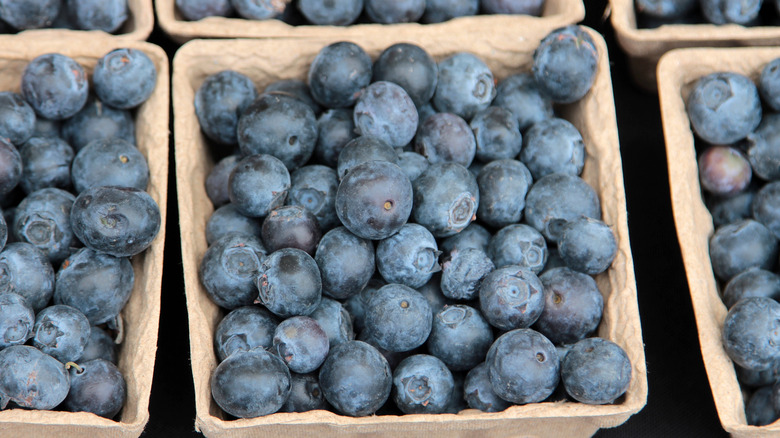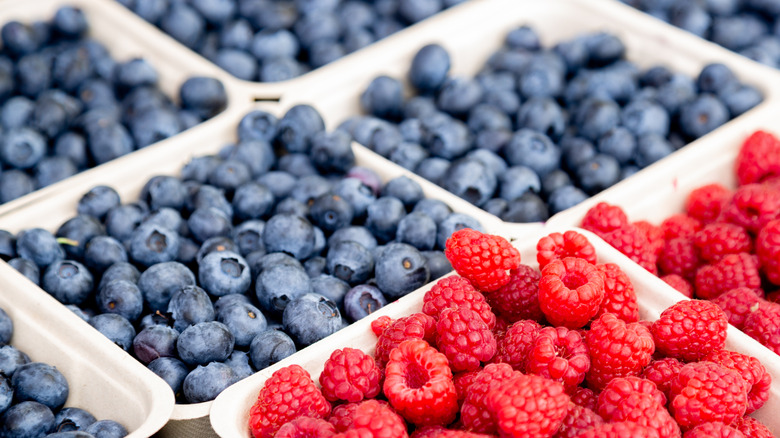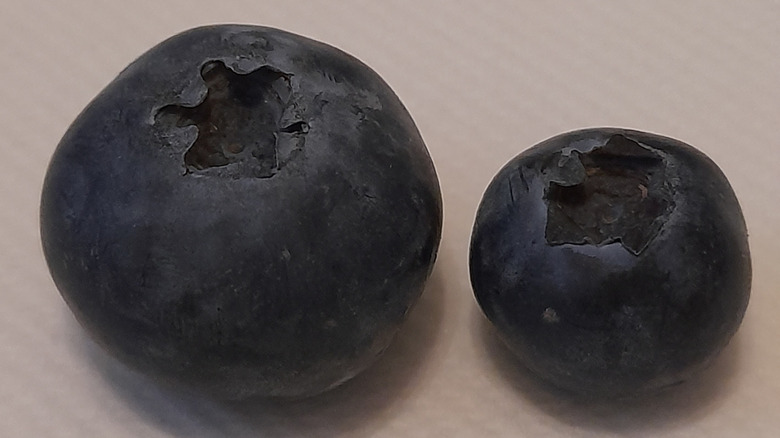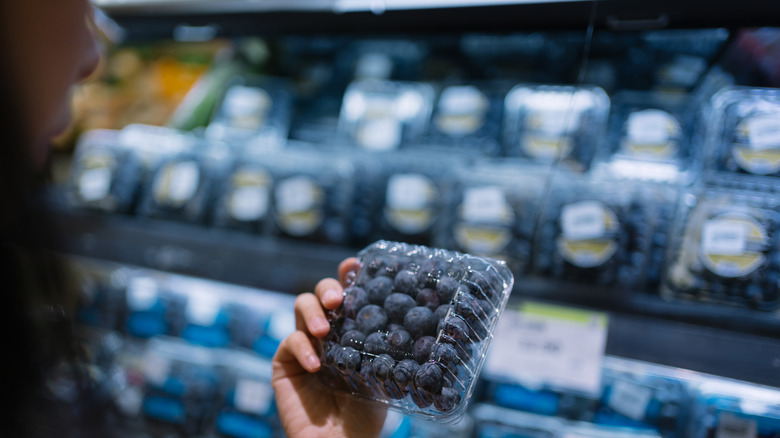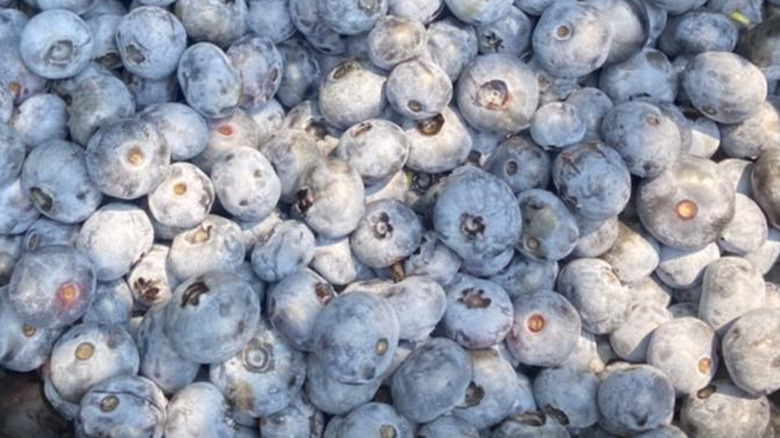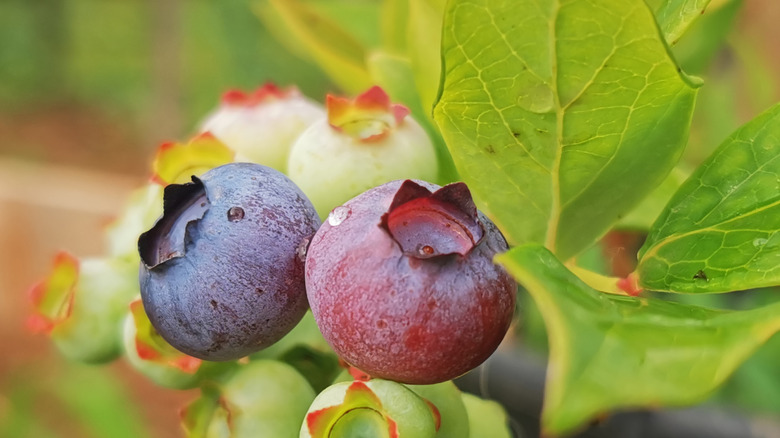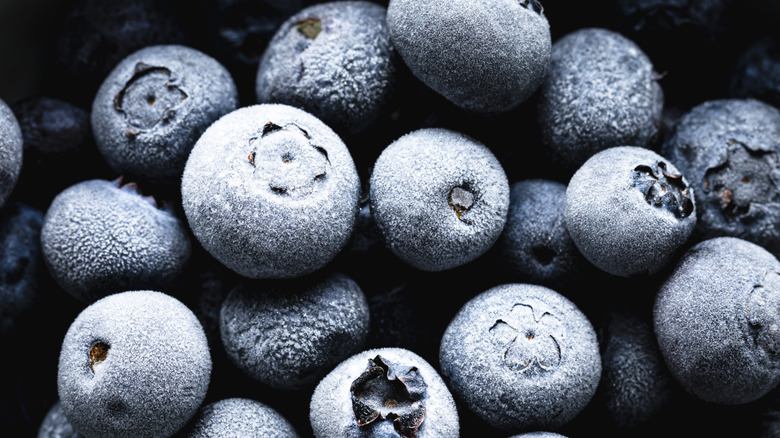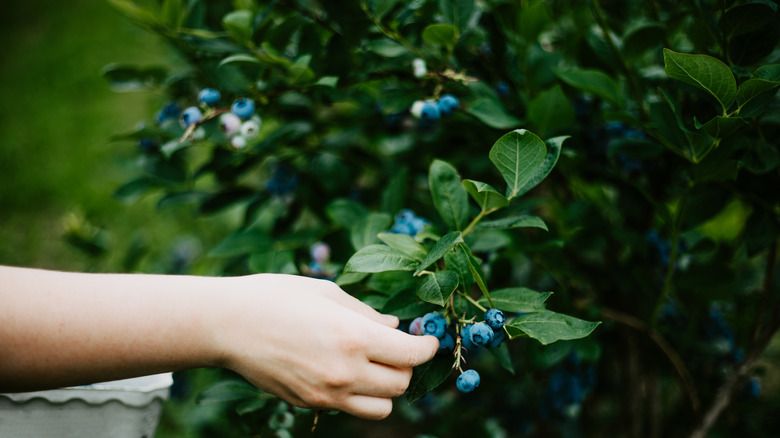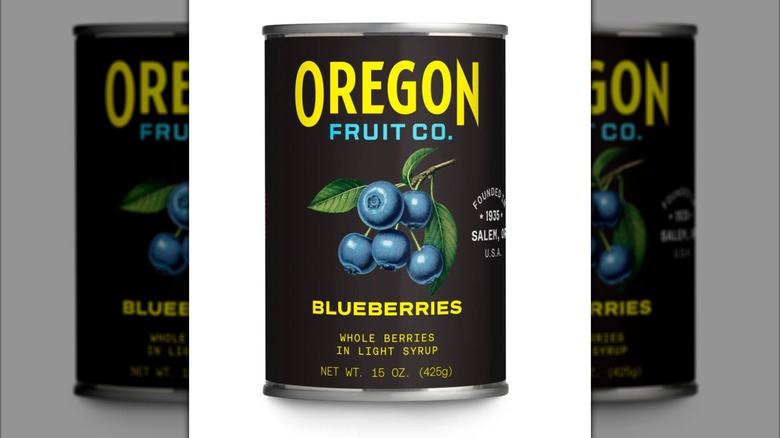12 Mistakes Everyone Makes When Buying Blueberries
Sweet and mildly tart, blueberries are just as good fresh off the bush or out of a container as they are in recipes. Whether baked into muffins or used as a topping on no-churn ice cream or a stack of three-ingredient pancakes, blueberries bring a natural burst of flavor that's difficult to replicate with other ingredients.
Like most other produce, blueberries are seasonal and easily damaged, which means that they may not always be as plump, vibrant, and full of flavor as shoppers might expect. However, this doesn't mean that with a little planning, you can't have fresh, high-quality blueberries year-round. All it takes is knowing what to look for when purchasing fresh blueberries. There are also several shopping strategies that home chefs can utilize to ensure they have the best possible quality blueberries out of season.
Ready to level up your berry-buying skills? Take a look at our roundup of the biggest mistakes shoppers make when buying blueberries — and the best ways to avoid them.
Buying fresh blueberries out of season
Not only are blueberries more affordable during peak harvest months, but they are also likely to have a better flavor and texture. Native to North America, fresh blueberries are of the highest quality from April to late September, when they are in season. Fresh berries purchased outside this time period are often imported from South America, and likely to have lost some of their sweetness and freshness during transportation.
Odette D'Aniello, founder and CEO of Celebrity Gourmet Ventures, the parent company of Celebrity Cake Studio and Dragonfly Cakes, explained the difference between in-season and out-of-season blueberries and why she avoids the latter. "If you're hoping for that vibrant, punchy flavor blueberries are known for, then yes — it's best to wait until they're in season," she told us.
Seasonality affects price as well as taste and texture. "Out-of-season blueberries tend to be bland and watery, and they're often more expensive due to shipping costs," said D'Aniello. "At the bakery, we don't even consider using fresh blueberries outside the Pacific Northwest berry season, and at home I try to only buy blueberries and blackberries when they're in season."
Not buying blueberries locally
Just as buying blueberries out of season can lead to higher costs and lower quality, buying berries that haven't been harvested locally may leave consumers with an inferior product. Courtney Stevens, seventh-generation farmer and owner of Wilmot Orchards, a family-run blueberry farm located just east of Toronto in Ontario, Canada, is an ardent believer that buying local is the best way of obtaining top-quality berries. "It's always better to buy local, and directly from the farm if possible," she said. "[This way,] you're going to get the best quality and flavour of blueberry because they don't have to be picked under-ripe to get to the grocery stores."
Buying local produce, including blueberries, also supports the local economy and agricultural industry, as explained by Stevens. "Many [agriculture businesses] are being lost to urban expansion, and if we lose local agriculture, we become more dependent on global food sources," she explained. "Soil quality is also impacted by urban expansion. Once infrastructure is built on farmland, the once nutritious soil becomes unfarmable."
Assuming that bigger blueberries are always better than their smaller counterparts
There is little doubt that fruits — including blueberries — are getting bigger. However, while they may initially look more appealing on the store shelves or in photos on Instagram, bigger blueberries don't necessarily translate to a better tasting product. In fact, larger berries can be noticeably more watery and significantly less sweet than smaller berries, especially if they have been grown in very moist conditions.
Bigger berries are also sometimes the result of selective breeding that favors size and appearance over flavor concentration. One reason for this is that commercial growers tend to prefer larger berries, as they have thicker skins and are easier to ship.
Courtney Stevens is quick to point out that the belief that larger, plumper-looking berries are superior in flavor to their smaller counterparts is a misleading myth. "The size of blueberries depends on the variety of blueberry, not the quality, so determining whether bigger or smaller blueberries are better is based on personal preference," she explained.
Failing to inspect blueberries for bruises and broken skin
Whether buying blueberries at the supermarket or at a farmers' market, visual inspection is key. Erik Muller, president of The FruitGuys, a company that specializes in gourmet fruit and snack boxes made from locally sourced produce, is always careful when he picks his berries. "When tasting isn't an option, your eyes can give you a lot of information," he told us. "If you notice blueberries that are moldy, smashed, split, wet, white where the stem was, or still green, look for a different container."
According to Courtney Stevens, looking for signs of damage on blueberries at the store can save you a lot of trouble later on. "Broken skin usually comes from insects or birds eating the berries while still on the bushes," she said. "You want to ensure your basket doesn't contain any of these berries because they spoil faster than others and can spread their decay throughout the rest of the pint." When free from damage and stored correctly, blueberries can be refrigerated for five to 10 days.
Not checking the container before making your purchase
While the best way of assessing the quality of blueberries is simply by tasting them, this isn't always possible at the supermarket, especially when the berries have already been packaged. Luckily, blueberries are typically sold in clear plastic containers that allow the customers to inspect them before making a purchase.
Melanie Marcus, chef, registered dietitian, nutritionist, and wellness and communications manager at the Dole Food Company, says that berry selection should start with inspecting the packaging. "When selecting blueberry containers in the grocery store or at the farmers market it's super important to pick up the container and turn it over," she explained. "You're looking for the packaging to appear clean and dry all the way through. Any moisture will speed up deterioration. Ideally, your berries will be stored in containers that have holes in them to allow for airflow."
According to Odette D'Aniello, when it comes to buying blueberries, a little extra inspection goes a long way to avoiding disappointment. In particular, she advises always checking the bottom of the blueberry container. "Blueberries are delicate, and if a single berry gets crushed or bruised in transport, it can spread mold quickly," she said. "I always flip the container, check for mushy spots, and make sure it's well ventilated. Look for firm berries and avoid any condensation in the box — it's a sign they've been exposed to temperature changes and might not keep long."
Steering clear of blueberries with white coating
Customers who expect supermarket fruit to look clean and shiny can be taken aback by the whitish film that sometimes coats fresh blueberries. While to the untrained eye this natural coating can look like mold or pesticide residue, it's actually a natural substance called "bloom" that protects the berries from the elements, as explained by Courtney Stevens. "There's no reason to avoid or be concerned about the white coating, or bloom, on blueberries," she said. "It is a protective, waxy coating that blueberries naturally produce, which protects the berry from moisture loss, insects, and bacteria. Consuming it has no adverse effects!"
According to Odette D'Aniello, the white coating is a great indicator that the blueberries haven't been overhandled or washed too early. In fact, she advises not washing the berries right until the last minute. "When people rinse off blueberries as soon as they get home, they remove that bloom and often shorten the berries' shelf life," she explained. "Sometimes it makes life easier to wash everything before it goes into the fridge, but in this case, washing right before eating helps you [keep the] blueberries for longer."
Skipping the smell test
While smell may not be the first thing that catches the attention of shoppers when selecting blueberries at the grocery store, it can be a useful tool for assessing the product's quality — right alongside color, taste, and firmness. Fresh, high-quality blueberries that are ready to eat typically have a pleasant, sweet, and mildly tart aroma. For this reason, it's best to steer clear of blueberries with no smell, as this may be a sign that they have been stored for too long and are no longer fresh.
Any unpleasant odors are a big no-no when it comes to selecting blueberries. It pays to be particularly wary of fermented or sour odors, as they typically indicate that the berries are beginning to spoil, even if they still look intact. This is highlighted by Courtney Stevens, who told us: "If the blueberries emit a wine or vinegar smell, I would avoid them because they're past their peak quality."
Expecting unripe blueberries to ripen at home
When it comes to blueberries, color is one of the most important indicators that they are ripe and ready to eat. Just as their name suggests, fresh blueberries should have a deep blue or purple color. "For the best flavor, we recommend choosing ripe blueberries and eating them right away while they're fresh," advised Erik Muller. "Their flavor usually doesn't improve after harvest."
Courtney Stevens seconds this testament, explaining that the color of blueberries should be the first port of call when determining whether to buy them. "You want to make sure that the berries are blue all the way around," she said.
When selecting blueberries at the store, it's important to check for any green or reddish patches, as these are sure indications that the berries haven't achieved their optimal ripeness. "Once picked, blueberries will continue to turn blue, but their flavor will not change, so unless you enjoy a very tart blueberry, I would recommend ensuring they're perfectly blue before taking them home," Stevens suggested.
Forgetting about frozen blueberries
As far as choosing frozen produce goes, blueberries should be a firm favorite. When fresh blueberries are out of season or past their peak, frozen blueberries are the next best thing. In fact, frozen blueberries are surprisingly close in flavor and nutritional value to their fresh counterparts, as highlighted by Melanie Marcus. "Most frozen fruit is individually quick frozen immediately after harvest," she said. "I often recommend frozen berries because this storage method preserves nutrients immediately." But be wary of freezing them for too long. "Extended storage in the freezer, beyond a year, for example, is when powerful anthocyanins begin to deteriorate and [the] texture [of the berries] softens," she warned.
Erik Muller shared a similar viewpoint, noting that blueberries frozen right after harvest are very similar to fresh blueberries when it comes to their nutritious profile. To back up his point, Muller said that frozen blueberries are preferable to ones that have been kept in storage. "In a 2017 analysis, scientists compared key nutrients in fresh blueberries, frozen blueberries, and blueberries stored in the fridge for five days," he said. "They found that fresh and frozen blueberries were both more nutritious than stored blueberries."
Failing to freeze fresh blueberries when they are in season
Blueberries are at their tastiest and most affordable when in season, so buying them in bulk and freezing them is a great way to ensure that you have quality, flavorful berries available year-round. This is the strategy advocated by Odette D'Aniello. "If you can, buy local blueberries and freeze them yourself!" she said. "Then you get some fresh blueberries when you first buy them, and then can use them in baking and smoothies throughout the year, and you know exactly where those blueberries came from." She also enjoys eating the berries straight out of the freezer, like bites of ice cream.
D'Aniello said that freezing her own blueberries not only allows her to enjoy local produce long after the blueberry season is over, but it's also a practical way of ensuring that her recipes come out just right. "In fact, for some of the fillings and compotes we make at Dragonfly Cakes, frozen blueberries give us the consistency we need without compromising flavor," she said, talking about her bakery business. "They break down beautifully into jammy, rich textures that you just can't get from watery, out-of-season fresh berries."
Not making the most out of U-pick farms
There is nothing quite like fresh blueberries picked straight from the bush. Whether eaten by the handful right there on the farm, used to upgrade your morning oatmeal or granola, or baked into a homemade blueberry babka, farm-fresh berries can elevate most snacks and desserts. Nevertheless, not all U-pick farms are created equal, with some drawing large crowds that can make it difficult to enjoy the experience, let alone get your hands on fresh berries.
Courtney Stevens, who is the owner of Wilmot Orchards, a blueberry U-pick farm, understands this problem, saying that it's precisely the reason she transitioned to a reservation-based pick-your-own system a few years ago. "It allows us to space out the arrival of guests and manage the number of guests coming in to pick, based on the quantity of blueberries available for picking throughout the season," she said. "If you want to plan your visit for U-pick to experience a less crowded farm, I recommend going later in the afternoon or into the evening, based on the farm's hours of operation. Avoid weekends if possible, as they are typically the busiest times for visitors."
Investing in canned blueberries
There are many reasons why shoppers might opt for canned blueberries — the main one being that they are affordable, convenient, and shelf-stable. However, home chefs who think that canned blueberries can match the quality and versatility of their fresh or frozen counterparts are in for a surprise. Many canned blueberries are stored in a sugary syrup, which makes them overly sweet for some recipes. They are also softer and mushier than fresh berries.
Odette D'Aniello says that canned blueberries are her last resort when baking. "They tend to be soft, overly sweetened, and packed in syrup, which can throw off the balance in a bake, she said. "I don't use them at all, at home or at Dragonfly Cakes — they don't give us the integrity or freshness we need in our fillings or toppings." In addition, canned berries also don't offer the same visual pop as a garnish or topping.
While D'Aniello says that canned berries can work in a pinch, a high-quality blueberry jam is a better alternative to fresh or frozen blueberries. She added that home chefs can even rehydrate dried blueberries cooked down into a quick compote and use them instead of fresh berries. "You have so much more control over the flavor when you make your own compote, and the texture can be really strange with canned blueberries — blueberry jam gives more of a home-y familiar feel," she clarified.
